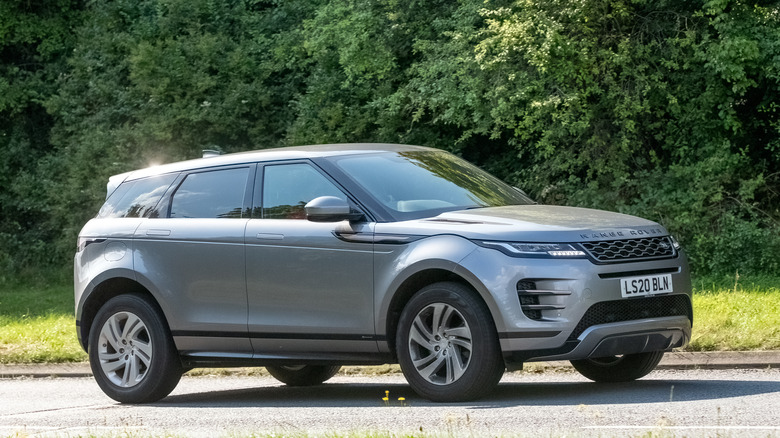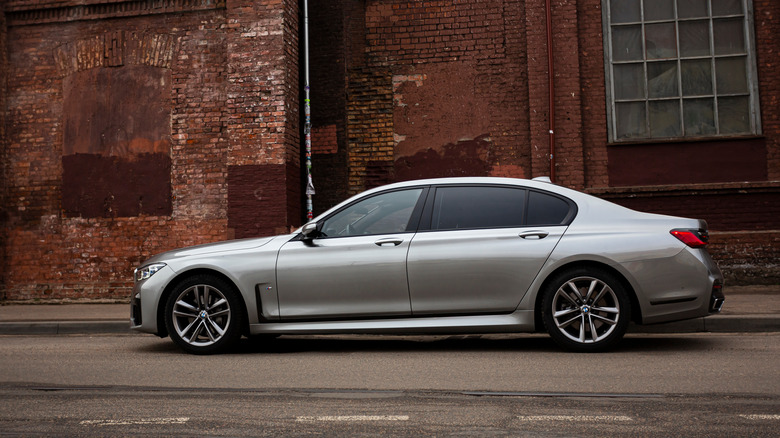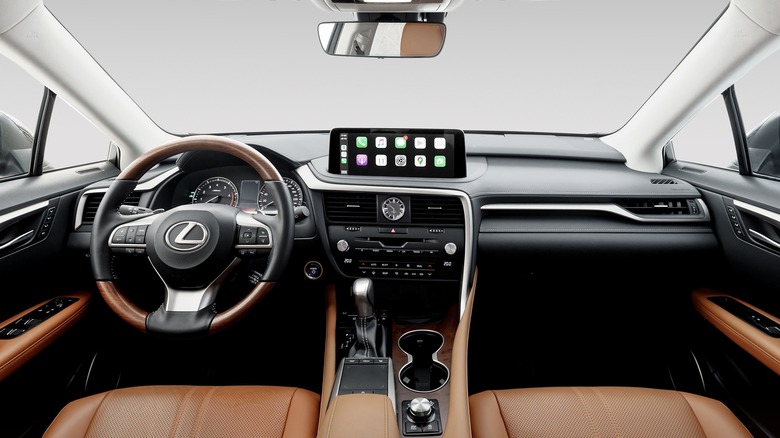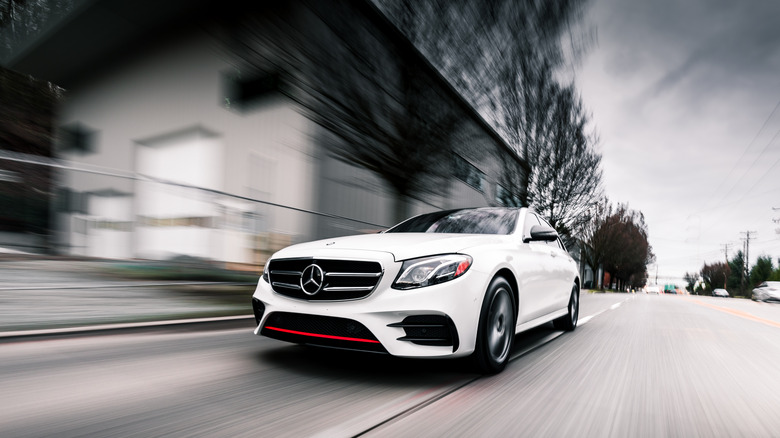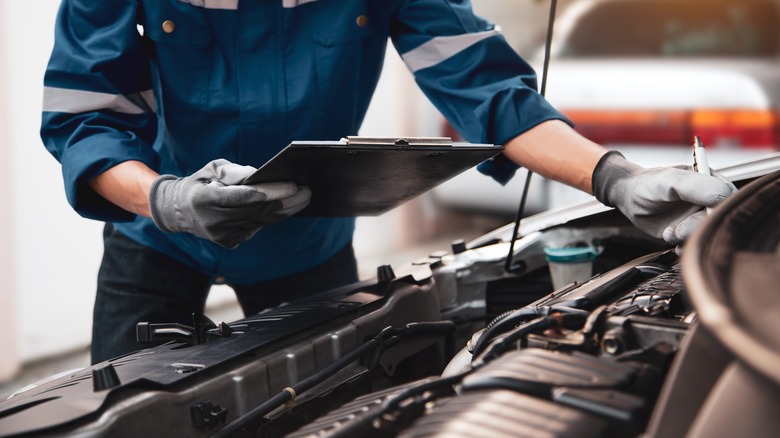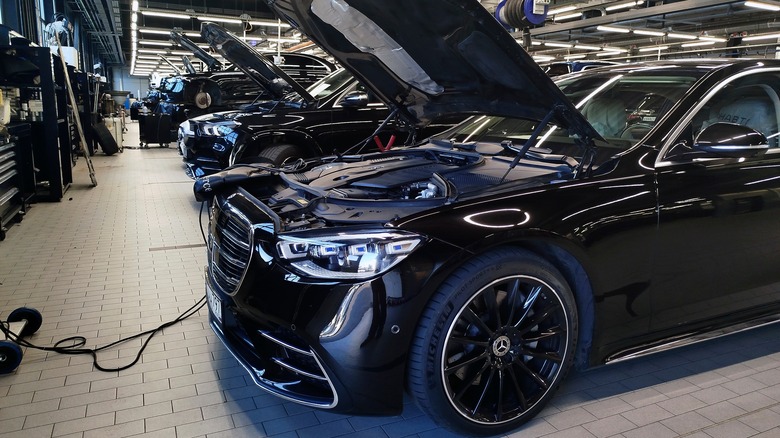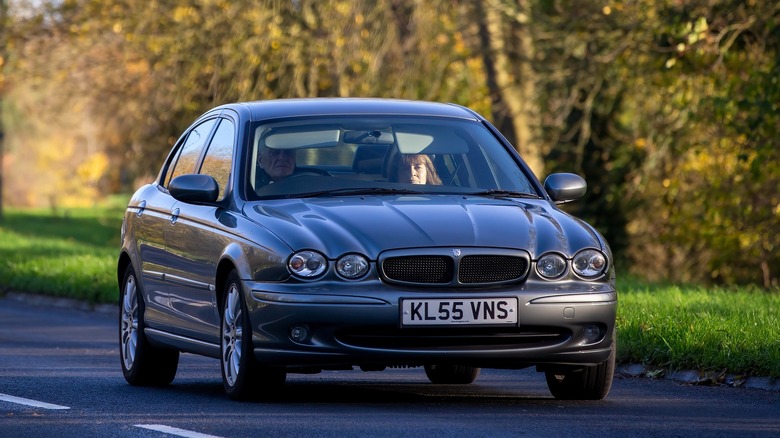5 Reasons Buying A Used Luxury Car Is Worth It (And 5 Reasons It's Not)
America's love affair with cars is legendary, despite inflation and seemingly even whether or not tariffs will make American cars more expensive. As of January 2025, Hedges Company estimates 298.7 million vehicles in the United States, or in other terms, around 860 per 1,000 people, according to Visual Capitalist. With a car for almost every individual, U.S. streets and highways are painted with a motley mosaic of trucks, sedans, SUVs, pickups, convertibles, and sports cars. A small percentage of those everyday vehicles are luxury cars, sleek symbols of success that stand out for their irresistible mix of sophistication, cutting-edge technology, and supreme comfort.
As reported by CBT News, a late 2024 Edmunds study showed that the average new car price hits a hefty $47,542 — in line with the cost of some used luxury models. So, when looking at upgrading your personal ride, why not indulge yourself with a more extravagant and distinguished option? For many, a luxury car, with its advanced features and prestigious air, has been a dream since high school or college. Here's the million-dollar question: is buying a used luxury car worth it? A secondhand lux-car brings undeniable advantages, but do not kid yourself; it likewise comes with quite a few pitfalls. So, whether you're chasing a lifelong ambition of driving a Jaguar, Mercedes, or Tesla to impress your old friends or to add excitement to your daily commute, it's essential to weigh the pros and cons of getting a used luxury car. Here are five reasons why buying a luxury car is worth it, and five why it may not be. Overall, it may not be worth it unless the car is destined to become a classic.
Worth it: Significant savings thanks to depreciation
A new car depreciates about 20% in its first year and 50% to 60% after five years, and luxury cars depreciate even more in absolute dollars because of their high starting prices. As reported by GoBankingRates, the following vehicles lose between 60% and 70% of their value after half a decade: BMW 7 Series ($65,000 lost), Jaguar I-Pace ($52,000 evaporated), and Tesla Model S ($50,000 gone). What do these numbers mean for a savvy buyer? In layman's terms, you could buy a 3-5-year-old elite ride for a fraction of its original price, as the maiden owner has already absorbed the bulk of the car's value loss.
Luxury cars provide great used-car deals for someone looking for a high-status vehicle at a discount. From Spero Financial's perspective, you might be shopping for a brand-new loaded Toyota Camry or Honda Accord for $30,000 but realize that for the same amount you could get a pre-owned BMW 3 Series or Mercedes-Benz C-Class. SUVs also depreciate heavily as well. Jalopnik reports that a full-size SUV like the Cadillac Escalade ESV loses about 61% of its value in five years. Meaning a $100,000 Escalade may be available for under $40k. In all these cases, depreciation is your friend.
Worth it: High-end features and technology at a lower price
Luxury cars have cutting-edge characteristics, higher-quality materials, and advanced safety systems, and the best thing is that buying a used one doesn't make a difference. Premium brands introduce the latest innovations years before they trickle down to mainstream models. Consider built-in navigation, first-rate surround-sound audio, adaptive cruise control, heated/cooled leather seats, air suspension, touchscreens, and airbags; all were initially introduced in expensive vehicles.
Often, what are standard amenities in a luxury car are ritzy add-ons (or not even available) in a brand-new economy automobile. In simple words, a used Audi, BMW, or Tesla provides advanced tech and levels of functionality that no budget car can match at the same price point. For instance, a Lexus RX comes with fine leather upholstery, real wood or aluminum trim, tri-zone climate control, and state-of-the-art safety suites. Although a secondhand luxury car may not have the newest version of the avant-garde engineering new models offer, it can still be quite advanced compared with a new mass-market auto.
Superior performance and comfort
Automakers design and produce their upper-class vehicles to perform at a higher standard; they accelerate, brake, and steer better than less expensive cars. With optimized aerodynamics and turbocharged V6/V8 engines, they deliver effortless power. Take the chassis and suspension in a BMW 5 Series or Mercedes-Benz E-Class; both are engineered for high-speed stability and pleasure. Thus, when you get a secondhand luxury car, be it a BMW X5 or Lexus RX, you will gain, apart from a more composed ride, stronger engine performance than with a new mid-range SUV. When comparing a luxury car to a regular car, "you quickly find there is no comparison," notes Volvo Cars West Houston.
With comfort, no doubt, a luxury car excels. They often feature seats with lumbar support, heating/cooling, and even massage functions. Plus, their adaptive suspensions offer a 'floating on air' sensation, bringing personal satisfaction to the owner — second owner, in this case. Upscale autos are crafted with higher quality, owners reporting that an older Lexus or Mercedes can still drive like new at 5-7 years old because of superior manufacturing processes. Such an elite touch is attainable at a non-opulent price. Therefore, many find used luxury cars to be worth it.
Worth it: Prestige and enjoyment without the premium price
Part of the delight of a lux-car is intangible — the sense of achievement in seeing a Mercedes star or a BMW roundel on your steering wheel, for instance. Also, parking a prestigious Jaguar or Porsche in your driveway, along with the sheer indulgence from driving something special, can bring a smile to your face. Who cares if they're used?
Oh, and don't dismiss the networking perceptions of having a luxury car. Arriving in a Toyota Corolla, an amazing ride in its own right, doesn't have the same effect as reaching a business meeting stepping out of a Porsche. That's a whole different level. As long as your used car is well-maintained, clean, and original, most people won't know your car has some years on it. They'll see the lavish badge and the classy design. Auto enthusiasts often recommend buying a used top-tier car instead of a new average one because of the smiles-per-dollar factor.
Worth it: Lower future depreciation and resale value retention
The idea is to buy a used luxury car at the right point in its life. A 2025 iSeeCars study highlights that while luxury cars depreciate most in five years, someone buying at the five-year mark is getting a bargain and will not experience the same steep percentage drop going forward. So, if you purchase a luxury vehicle after it's lost half its value, the remaining 50% won't be gone in the next few years. The car still devalues, of course, but at a much slower rate once the first chunk is gone. This means you could resell your high-performance exotic vehicle some years down the line without a massive loss, mind you, if you keep it in good condition and the model is desirable.
With numbers: a luxury car was $80,000 new; you bought it for $40k. After three years, it fetches $25,000; a $15k loss. This is way less compared with the $40,000 the first owner lost in the initial four or five years. But there are exceptions. Some models hold steady or appreciate slightly once they become older classics and may be worth a ton of money. The Lexus RC coupe, for example, retains close to 65% of its value after half a decade, and the SUV Mercedes G-Class keeps around 60% over the same period. They seem not to follow the common depreciation rule.
Not worth it: Higher maintenance and running costs
You might be allured by a used luxury car price tag, whispering, "I can afford that." Aside from prestige, price is another reason you want to buy it. But do you have the means to keep it running month after month? By nature, elite cars have more complex engineering that requires overpriced and demanding upkeep. Used cars generally demand more maintenance than new ones, and used luxury cars are no exception. Over the years, the chances of component failures increase, and when those parts are high-tech or imported, the cost to fix them can significantly lower their appeal.
Given the chance to get a used 5-year-old car, immediately budget for pricier routine services, namely oil and filter changes, brake pads, spark plugs, timing belt, tires, water pump, etc. To illustrate, an oil change for a 2025 Honda Accord starts around $59.95 In contrast, for a 2020 BMW 530i, the cost can reach $249. Oh, and don't forget that luxury vehicles are allergic to non-specialized mechanics. Do not even consider letting untrained hands touch an expensive upper-crust car. Have you seen those tightly packed German engine bays? For that, you need expert labor, which translates into higher charges.
Not worth it: Expensive repairs and parts replacement
Luxury cars incorporate high-class, long-lasting components, but when they finally break down, because they will, the repair and replacement costs can be horribly astronomical. This factor is a key reason a used luxury car might not be worth it. DrivenCarGuide noted that parts aren't any cheaper than they were when the car was new. Take, for example, a suspension system. Luxury SUVs and sedans use adaptive dampers or air suspension for a smooth ride. When they fail on a used Range Rover, for instance, fixing them ranges from $4,567 to $4,715, as per Repair Pal.
Other areas of concern include the engine and transmission. Lux-cars push high performance from their drivetrains, translating into more stress on components. Also, consider that a used car might have hidden wear. When an engine rattles, hisses, clicks, or whines, a wallet judgment day draws near. Here's a horror story: as reported by Euroworx, once upon a time a buyer got a 4-5-year-old BMW X5 (just out of warranty). But after driving it for a while, the car demanded a new engine, which, be prepared, cost $18,000 — nearly as much as the car's value. While an extreme case, it can happen. But this terrifying recount pales in comparison to replacing a Tesla's batteries. They come with a warranty of eight years or 100,000 miles. But replacements range from $5,000 to $20,000. In many cases, plus labor costs.
Not worth it: Higher fuel and insurance expenses
Now, look at the not-so-evident outlays: fuel and insurance. Luxury cars feature heavier frames and larger, more powerful engines. So, you'll need to fill up with premium gas more often than you would in a less extravagant vehicle. Comparing models, a 5-year-old BMW 540i (turbo 6-cylinder) gets around 22 MPG (miles per gallon) combined. Whereas a 2025 Toyota Camry (4-cylinder) yields an estimated 53 MPG. If you drive a lot, the difference adds up. Creepier examples include a 2013 Range Rover, consuming a gallon of gas every 12-13 miles in city driving, and a 2019 Cadillac Escalade getting 14 MPG in similar conditions. Both of them are real wallet drainers at the pump.
Regarding insurance, even if the luxury car is used, coverage costs rise higher than those of an economy or mid-range vehicle. Why are they more expensive to insure? Because they have a superior value. As noted before, luxurious autos have expensive parts and can be costly to fix after accidents; hence, companies charge a premium to cover that risk. For example, a minor bumper fender-bender in a Lexus or Tesla could involve pricey sensors or aluminum body panels, leading to large claims. At the same time, since many luxury vehicles, like sport models, come with powerful engines, insurers may view them as magnets for collisions or speeding. Also, lux-cars carry steeper registration or property taxes (some states base vehicle taxation on original MSRP).
Not worth it: Reliability concerns and the risk of costly surprises
Here comes uncertainty, a big deterrent. Luxury cars are reliable indeed, but they develop issues as they age — issues that might be frustrating and expensive. By the time an exotic elite car celebrates its 7th or 8th birthday, perhaps, it leads to hefty repair expenses. The complexity of luxury cars means more can go wrong with their sophisticated electronics, turbochargers, air suspensions, AWD systems, etc. Add insult to injury if the previous owner failed to attend the car's mandatory services religiously. Then, those latent problems become yours. So, an affordable $25,000 used Lexus quickly turns into a financial burden.
An iSeeCars study mentioned that many luxury cars have "reliability headaches" as they get older. A good idea is to have an independent specialized mechanic check the vehicle instead of trusting solely a service sheet from a seller. You don't know the kind of life the car has been through. Skip those important checks and you could find out way too late that the vehicle needs thousands in work. Take note of this as well. Even if nothing is outright broken at the purchase of a decade-old luxury car, rubber components like gaskets, hoses, and bushings wear out and need to be changed. All those little expenses pile up.
Not worth it: Outdated technology in older models
This is often an overlooked downside. Technology evolves quickly in the automotive world. Thus, a 10-year-old cutting-edge lux-car now feels like a technological dinosaur. If you happen to buy a used high-end car, you could be getting obsolete tech compared to a brand-new economy car. And the fancy features that once made a luxury car shine may no longer impress or even work optimally by the time you own it. Why is this important? Because today's $25,000 car might have better infotainment, improved safety attributes, and more comfort than yesterday's $65k car.
As an example, a 2013 luxury sedan with a built-in navigation system and Bluetooth may lack Apple CarPlay/Android Auto integration; manufacturers introduced both in 2014 and became widespread in 2016. Meanwhile, a 2024 mid-range sedan will likely have seamless smartphone connectivity, a touchscreen with modern graphics, and features such as a 360-degree camera or adaptive cruise control — elements an older upscale vehicle doesn't have. So, if you're a technophile and are expecting the latest gadgets, a used luxury car might disappoint. You can put any aftermarket additions in if you wish, but it's not the same, and the car could appear kind of peculiar. Except if you prefer it that way. In view of this, some people opt to lease new luxury cars to always have the newest tech.
A luxury car is not a great financial investment unless ...
Owning a luxury car is rarely a good investment. Cars are depreciating assets. As Dave Ramsey notes, if you lack true wealth, spending a lot of money on a car is unwise. Ramsey's rule of thumb suggests that your vehicle's total amount should not exceed half your annual income. He even goes so far as to advise car buyers not to buy a new car ever, until their net worth is more than $1 million. While extreme, the basic idea is clear — luxury cars are, by definition, splurges, not necessities or money-makers.
The exception? If the used luxury car you intend to buy becomes a classic car worth a small fortune. But you don't know if that'll happen. In "The Transporter" (2002), Jason Statham drove a 1999 BMW E38 735i V8 fitting the demanding driving sequences in the film. But will that car meet classic status like James Bond's 1964 Aston Martin DB5? Classic cars are highly collectible; they marked an era and appreciate in value. For instance, the 1957 Mercedes 300SL was a luxury car and today is a classic. Most collector cars might not have touchscreens, hot/cool seats, or air suspensions, but they are mighty and timeless. Examples include the 1965 Lincoln Continental, the Cadillac Series 62 Convertible, the 1957 Ford Thunderbird, the Jaguar E-Type, and the 1963 Corvette. These are super valuable now because their components don't degrade over time. In those cases, a used luxury car might be worth the investment.
